(My People Shall Know The Way) - Foundation
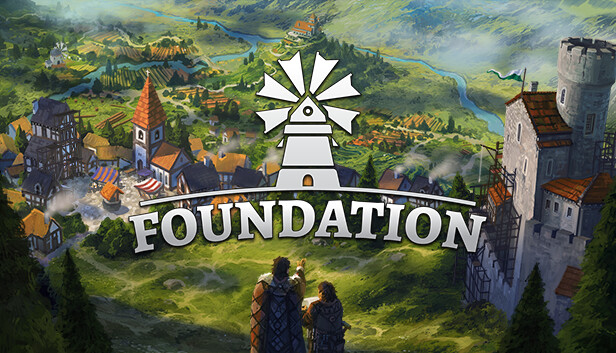

It's not everyday you play games that let you play a city builder, and a medieval strategy title without feeling like you have to constantly watch your back. Full of options in choosing the geography, and kind of city you want it to be. Monastery, kingdom, military establishment, or anything else.
Today's day and age, with Manor Lords and Tiny Glade being around, this one hung around EA from 2018 till now. But then it feels like you're playing medieval SimCity, while also heavily leaning towards resource management and slow growth. Though, I'd advise going in free for all mode, soon I tried something challenging, I got thrown off very easily.
Runs smoothly, the UI is intuitive enough to understand, it also relies on the A.I. to do almost everything, though I'd say that's one of the small few things holding it back. But hey, you're putting buildings absolutely gridless, and probably a fun city economy in many ways.
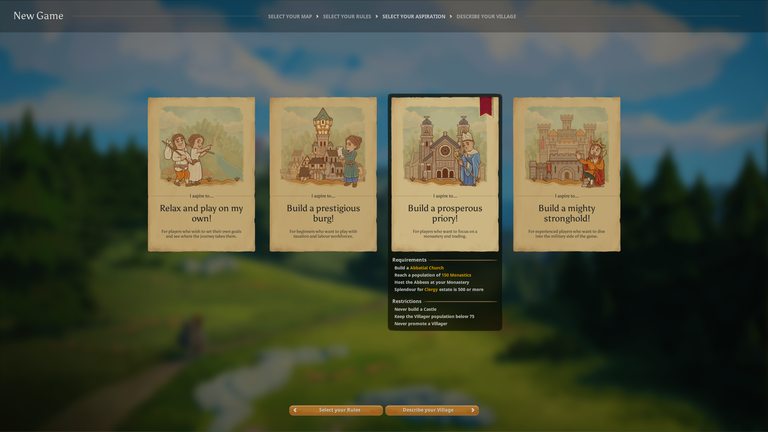
Before you start, you have to pick the map, you know, like I said with geographical options. You want more rivers, fewer rivers and more land? Build around cliff and mountains? How many trees? There you go. Set the rules, either play it grounded or just get unlimited resources and such.
I'd advise an easily curated experience if you don't exactly know what you're getting into. Just to ease into the base gameplay, and then the systems that'll introduce themselves later on. Heck, just build on whatever suits you fancy, then take on what establishment you pick on your next city. It's important since you have limited land to use, and things get stuffed easily.
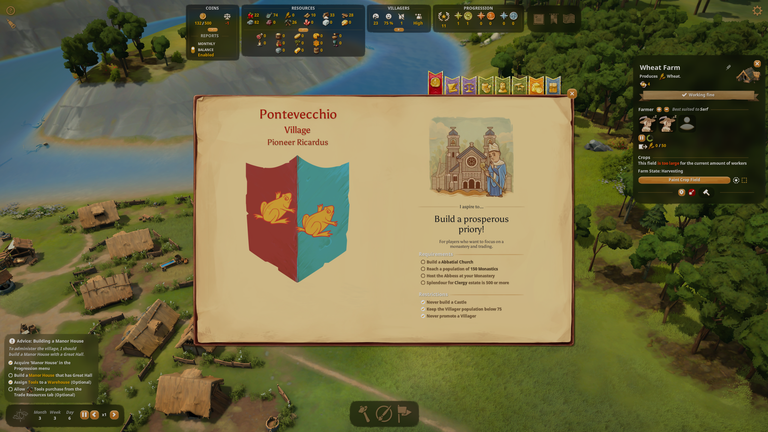
Right, so I did this because I needed an objective, the guides help out a lot, actually. What they didn't tell me was how much of a busy body I was going to be. Make the area inhabitable, maintain the status of the villagers making sure they're happy, and manage resources.
You know the things you have to do where people need jobs and help you get resources. To start with, I had to build wood cutters, and berry pickers. Then from there, fishing ports, stone quarries, etc. Jobs don't hire themselves, so I have to prompt how many workers each of these establishments will have. I start off with 10 population, but more immigrates in time.
Also, you don't have to build houses, thank god, just manually paint areas where they can do that, and people build themselves. Same applies to woodcutting and growing them, wheat harvesting, and so on. This part of the game works really well, but as long as you continue to buy land, which you need coffers for. Hence, why I mentioned going for the unlimited resources, and such, so you can know how far you can stretch these things out. Because going far takes a long time.

I have to build a monastery, and I'm still long ways off. Not everything's free, neither is progress. Village ranks up, I can unlock other establishments for clothes, refined foods like bread, tools, which you'll definitely need, meat harvesting, and more.
Later on, I can also establish trade routes with neighbors, have merchants and envoys coming in to buy and sell them off. This is where the economy factors in, you need to know what your neighbors, and have ample of resources to sell. You need coffers, to do everything from unlocking establishments through provisions, and building them.
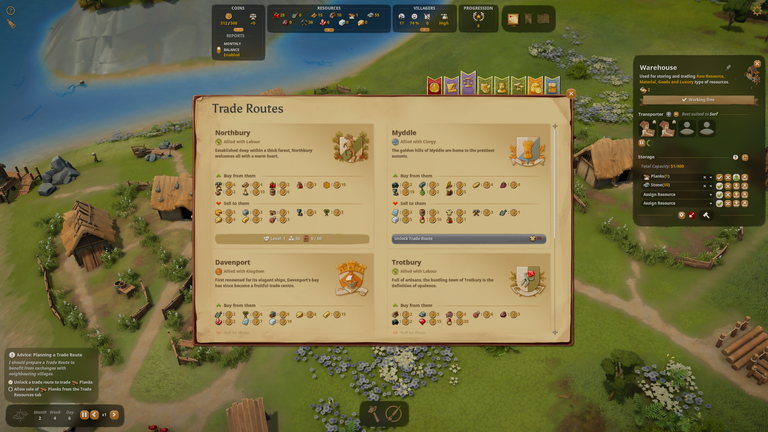
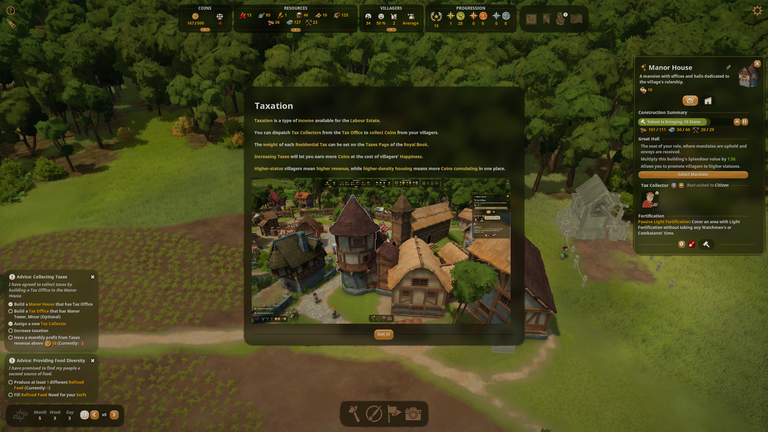
My favorite part of the game, you want coffers, you need to increase your residence, and also tax them. Heck, even if it's dissatisfying to the residence, you can counteract that by creating other amenities in the near future. Just make sure you build a manor for mandates like levying money, and then tax offices before hiring the collectors to do so.
It wasn't easy building this, I was confused after waiting so long since the A.I. took their time carrying the resources, and finish building. Turns out, I have to build light fencing before the tax option was available. Great waste of time, I'd say, but probably was my fault.

And as mentioned before, having enough residence does provide room for hire, taxation, and reparations from services. But you need to buy lands for that. First few are free, later on, you have to deal with the choice you made on the terrain as well.
Though, not always a bad thing, there's so much to earn, and provide. Trade routes are also available in plenty. The other rare stuff like gold, gems, and such, even if you don't find them, can find myriad of ways to maintain and increase upkeep. It's future rich in allowing you to figure out how to do so, with the simulation eventually playing out as you'd expect without too many variables.

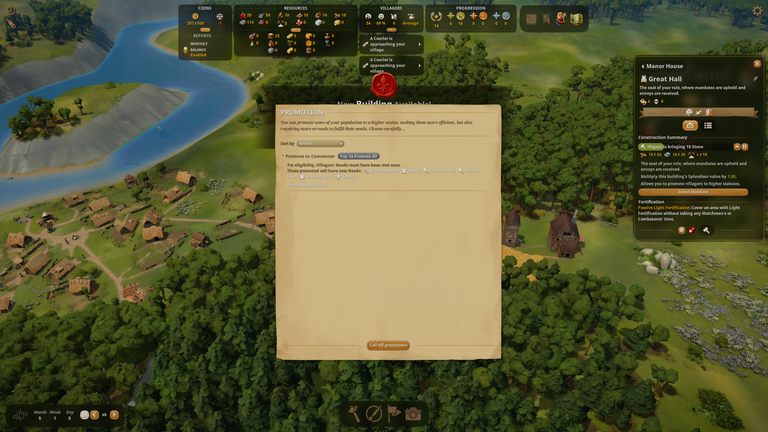
To me, Foundation is a healthy, educational game, it's not as fun and interesting as Manor Lords, or creatively expressive as Tiny Glade, it manages to touch on somewhere between the two, while doing something else entirely. Though, I wish I could say I know much more.
Most people who approached this game played it as a relaxing city builder. You can build military installations, declare war, or provide troops with your neighbors for contract works. Just like how the US military does it. I've probably touched just the tip of the iceberg on this, and most people I've looked into from YT, barely even got far. Yet the steam reviews have a different entire story around them, because it's been in early access for a long time. Even the visuals look super appealing.
Village A.I. still needs a few tweaking, they're good when they work, but other times, not really. This one takes a bit to understand at first, before being fully invested into. You can also easily stumble if you're not careful with how you manage currency. But the more I kept playing, the clearer it was becoming of what kind of city builder I wanted to be in medieval times.


This game looks like a neat city builder with a lot of innate features. 👍 Thanks for crafting this post.